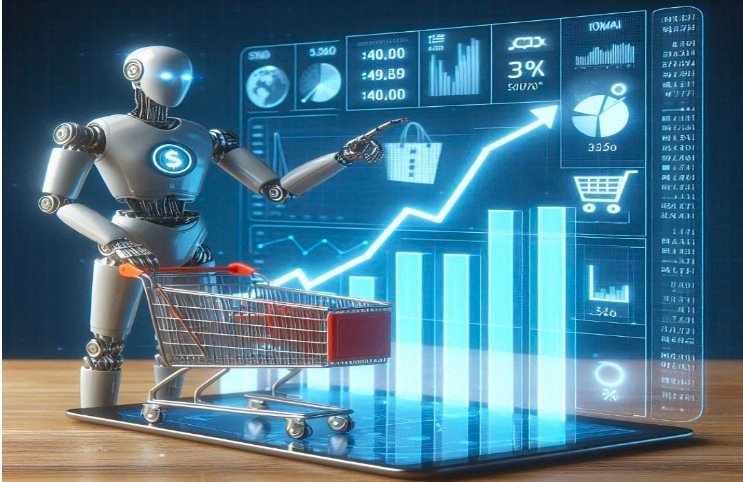- Introduction
- Role of AI in Retail
- Benefits of Automating Retail Operations
- Key Areas of Automation in Retail
- Summary
The retail sector is characterized by old ways of doing things that worked well in the past but cause many problems and delays in processes now. Most of the tasks in retail sectors, such as data analysis, customer service, and product control, that are done by hand could lead to mistakes, wasted time, and higher costs. With traditional strategies, retailers face many problems. These old-fashioned ways of doing things could slow down progress and make customers less happy.
AI has the power to change the way the retail sector works. Using artificial intelligence, retailers can eliminate boring tasks, learn useful things from data, and give each customer a personalized experience. AI systems, like chatbots, smart inventory management, and data-driven marketing strategies, improve customer interactions. Automating retail operations with AI can provide data-driven marketing insights that will help retail sectors run more efficiently, cut costs, and meet customer needs.
Role of AI in Retail
Integrating AI has changed every industry, and retail is no exception. With AI machine learning algorithms, natural language processing, and data analytics, retailers can examine how customers behave, streamline processes, and improve their overall operations. These AI technologies help retailers make intelligent decisions about inventory management, pricing, and marketing efforts by analyzing huge amounts of data, finding trends, and predicting future customer demand. AI-powered chatbots and virtual assistance are the key elements in retail sectors to improve customer service. They can answer questions right away, walk customers through the buying process, and even handle help after the sale. Therefore, the role of AI in the retail industry becomes very important in automating various tasks.
Benefits of Automating Retail Operations with AI
Enhanced Efficiency
Automation speeds up repetitive chores and cuts down on mistakes made by people. This frees employees to focus on more important tasks, like strategic planning and customer service. Automating inventory management can reduce stock changes and improve the process of restocking.
Cost Reduction
Retail sectors can cut operational and labor costs by automating tasks that used to be done by hand. However, high costs are cut down and are made possible by better resource use and less waste caused by automation. AI-driven chatbots can automate work processes 24/7 and get more benefits without hiring more people.
Improved Customer Experience
AI-personalized shopping experiences let stores make suggestions based on what customers like and how they usually buy things. If you customize things, your customers may find more choices and be more likely to purchase from you again. This faster-automated service can keep your customers like your brand services and stay happier.
Data-Driven Insights
AI-powered automation system speeds up the process and analyzes data-driven ideas in stores quickly. Leveraging AI can help retailers make better predictions about their inventory, streamline their marketing efforts, and change how they run their businesses. It is capable of doing things faster, which will help retail sectors adapt quickly to market changes and promote a mindset of continuous improvement.
Scalability
Automated systems can quickly expand when demand goes up to meet it without making significant new investments. This flexible process allows retailers to respond rapidly to market growth and change opportunities. As a business grows, automated solutions ensure that processes stay stable and high-quality. This supports long-term growth through consistency.
Key Areas of Automating Retail Operations with AI
Inventory Management
Hire AI developer to leverage AI-powered automation services in your inventory management to simplify supply chains to predict demand, maintain stock levels at their highest, and monitor the restocking process. With the Automation process, the stockouts and overstock processes can help retailers maximize their sales opportunities and reduce their handling costs.
Customer Service
AI-powered chatbots and virtual assistants can work 24/7 and help customers in real-time by answering questions, processing orders, and handling returns. This automation and quick process will make customers happier and give workers more time to work on more complex tasks.
Marketing Automation
AI can analyze customers’ wants, regardless of their number; it can send personalized marketing messages and email campaigns automatically by analyzing their data. This process will not only focus on the approach to ensure that marketing efforts reach the right people but also raise the engagement and conversion rate automatically.
Sales Forecasting
Artificial intelligence algorithms can analyze past sales data, market trends, and how customers have behaved in the past to guess how sales will go in the future. These numbers help shops make choices about hiring people, keeping track of their stock, making marketing plans, and other things.
In-Store Operations
With technologies like RFID, self-checkout, and smart shelves, they can automate the actual stores to streamline in-house operations. These changes will benefit and make it easier to buy products. This automated process will allow the employees to focus on necessary tasks.
How will AI and ML Reshape the Retail Sector in the Future?
Leveraging AI/ML development services in retail processes is a great way for businesses to become more efficient, cut costs, and make the customer experience better. The world is becoming more and more digital these days. Therefore, retailers who want to automate key tasks like customer service, marketing, sales forecasts, inventory management, and in-store operations need to connect AI automation agencies not only to stay competitive in the present but also in the future as well.
There is no doubt that AI and ML are futuristic technologies. Therefore, every industry is looking to implement them to automate various business processes. However, adoption according to change is the best solution, and retailers who want to meet customers’ needs and make their businesses more sustainable need to accept both AI and ML.

